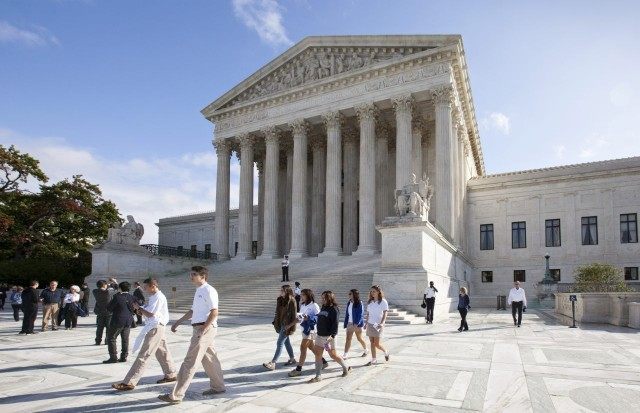WASHINGTON—Obamacare, religious liberty, Iran, and racial preferences are four of the major issues the justices will confront during the Supreme Court’s annual Term, which begins Monday, Oct. 5.
The High Court will decide between 70 and 80 cases over the next nine months. The justices have already accepted 40 cases for arguments, typically by granting what is called a petition for a writ of certiorari. Over the next four months the Court will grant review of the remaining cases for this year’s Term.
The Supreme Court will hear arguments in a few months in what could be a watershed decision on racial preferences. Years ago, the Supreme Court held that the government’s preferring one race over another—under the euphemistic label “affirmative action”—can sometimes be constitutional to remedy past racial discrimination. In Fisher v. University of Texas at Austin, the Supreme Court will determine whether such racial preferences in college admissions violate the Fourteenth Amendment’s Equal Protection Clause. In 2013, the Court sent this case back to the lower courts for a critical examination of the roll of race in admissions at the University of Texas. The High Court’s taking this case up a second time is widely considered to be a sign that the justices may be ready to fundamentally change the way the law views questions of race.
Sometime during the winter, the Supreme Court will hear two major election cases. In Evenwel v. Abbott, the Court will determine whether the Equal Protection Clause’s “one-person, one-vote” principle allows states to draw legislative districts based on total population, or instead requires that states draw district lines to evenly represent voters in those districts, to the exclusion of all foreigners, including illegal aliens. Then in Harris v. Arizona Independent Redistricting Commission, the Court will determine whether it is unconstitutional to deviate from the “one-person, one-vote” principle in order to give one political party an advantage over another.
Also during the winter months, the Court will consider a First Amendment case that could have major political consequences for unions. In Friederichs v. California Teachers Union, the justices will decide whether it violates government employees’ free-speech rights to compel them to give public-sector labor unions dues that will then be used for political advocacy. The Court held in its 1977 case Abood v. Detroit Board of Education that forcing workers to fund political speech they disagree with is acceptable under the First Amendment. In Friederichs, the Court will decide whether to overrule Abood.
On Oct. 1, the Court granted certiorari in Bank Markazi v. Peterson, a politically charged case against Iran. A lower court ruled that families of victims of terrorism could access frozen Iranian funds to compensate them. Congress passed a law in 2002 to enable families to access $1.75 billion in frozen assets. The Obama administration asked the justices not to take the case, but they rejected the president’s request, and now the Supreme Court will decide whether Congress’s law violates the Constitution’s separation of powers.
On the Court’s first day (Oct. 5), it will hear arguments in OBB Personenverkehr AG v. Sachs, a case raising issues of when foreign nations enjoy sovereign immunity that exempts them from the authority of U.S. courts. Specifically, the Court will determine when, under the Foreign Sovereign Immunities Act, a foreign business is considered an “agent” of a foreign nation because its actions are not considered “commercial activities,” and thus that American courts lack jurisdiction over the company.
Later this week, the Court will consider in Kansas v. Carr—and the following week in Hurst v. Florida—whether the Eighth Amendment’s ban on “cruel and unusual punishments” forbids the death penalty, or more narrowly whether the types of executions performed in those states are unconstitutional.
In coming weeks, the Supreme Court will decide whether to take additional hot-button cases, including a challenge to abortion restrictions, and the latest religious-liberty challenge to part of Obamacare.
Ken Klukowski is legal editor for Breitbart News. Follow him on Twitter @kenklukowski.

COMMENTS
Please let us know if you're having issues with commenting.